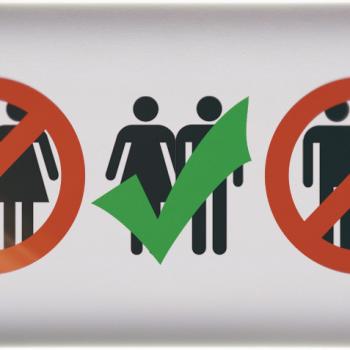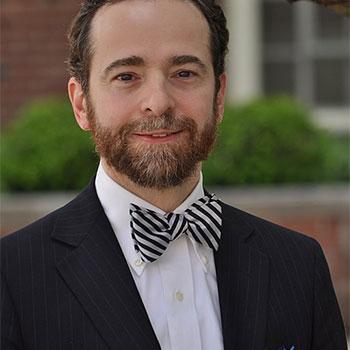
The so-called “third way” is really very helpful. It has a lot of merit.
There. I said it. You can commence my crucifixtion now.
For those who are unfamiliar with the so-called “third way,” here’s a brief explanation. As far as I can tell,[1] the “third way” is a term popularized by Ken Wilson who is the Senior Pastor at the evangelical Vineyard Church in Ann Arbor, MI. In his book A Letter to My Congregation,[2] Pastor Wilson describes his own journey to acceptance of people who are gay. Using the apostle Paul’s example of dealing with the meat-eating controversy in Romans 14-15, the good pastor advocates allowing the sinfulness of homosexuality to be a “disputable matter” in the church (i.e., a matter on which faithful Christians can disagree). By taking this approach, the Vineyard congregation has decided to accept into full membership and leadership Christians who are in (or are pursuing) gay relationships.
Several months after Wilson’s book was published, a controversy arose when Pastor Danny Cortez wrote a letter to the estimable blogger John Shore detailing how he, too, has had a change of heart about the sinfulness of gay relationships, and how the Southern Baptist church he leads has now decided to become a “third way church” and “accept the LGBT community even though they may be in a relationship.”
Unsurprisingly, Al Mohler, the head of the Southern Baptist Theological Seminary, had a conniption fit. His position is: When it comes to condemning gay people, you’re either with us or against us. In his blogged rebuke of Pastor Cortez, Mohler opines:
There is no third way on this issue … the issue is binary. A church will recognize same-sex relationships, or it will not. A congregation will teach a biblical position on the sinfulness of same-sex acts, or it will affirm same-sex behaviors as morally acceptable. Ministers will perform same-sex ceremonies, or they will not.
More surprising to me is the reaction of many gay-affirming Christians. To them, nothing short of full affirmation is acceptable in the church. It’s the same “with us or against us” sentiment that Al Mohler expressed, just in a different direction.
I have a ton of respect for gay Christian blogger Ben Moberg (aka The Registered Runaway). He recently wrote a very balanced criticism of the “third way” concept. He stated the objection this way:
But Same-Sex Marriage is not the kind of issue a church can possibly ride the fence on. This is a reality. A same-sex couple is going to go to one of these Churches and the church will either affirm their marriage or they won’t. Where is the Third Way? It’s a fair question that isn’t being answered.
I understand the push back. I really do. As a man who is both Christian and married to a man, I know how it feels when my humanity is put up for public examination and diminished by traditionalist theology. I know how it feels to hear that the sanctity of my marriage is “disputable.” I know why people bristle at the idea that it’s OK for congregants to maintain destructive beliefs about people who are gay.
But the so-called “third way” has merit. Here are some things for gay-affirming Christians to think about before condemning the “disputable matter” approach.
Change of heart is not an event, it’s a process.
I’m sick to death of polarized language. There is an entire spectrum of Christian belief about the sinfulness of homosexuality that ranges from complete rejection to complete inclusion.[3] We do ourselves a huge disservice by labeling beliefs “Side A / Side B” or “affirming / non-affirming.” Most people don’t jump from one end of the spectrum to the other — I know I didn’t. The chasm is too great; the distance is too far. Most people move along the spectrum, almost invariably, towards inclusion. Forcing people to take “sides” (as Al Mohler does) is likely to entrench traditionalists in their beliefs.
In the third way, “Gay is sin” is no longer gospel truth.
In most conservative churches today, the fourteen year old gay kid in the front pew is hearing that he is deeply flawed in a way that makes him unworthy of even the possibility of love. In the view of these churches, there is no debate – to them, gay couples are simply depraved. However, in a third-way church that kid gets to hear another side to the story. He will know and be encouraged by Christians who affirm his humanity. A third-way church is safer for that kid. That’s no small thing.
Third-way pastors give their congregations permission to believe differently.
In the cases of both Pastor Wilson and Pastor Cortez, they’ve taken their journey towards the inclusion of gay people. By adopting the third-way, they have invited their traditionalist congregations to join them in that journey. By granting permission for disagreement within the congregation, these pastors are also allowing individuals to faithfully challenge their personal beliefs. I’ve said for years that if the Church is truly interested in loving people who are gay better, we must believe differently. The third way gives congregants that opportunity.
“Disputable matter” does not mean “agree to disagree.”
Perhaps the biggest misconception about the so-called third way is that it is somehow a passive attempt at unity. That’s not so. True Christian unity — and true discernment of God’s will — comes from the open exploration of our differing understandings. The reality of a third-way congregation is that some congregants will affirm the marriages of gay couples, some will not; but nobody will exclude the couple because they are gay. Unity demands that we engage with the tension rather than ignoring it. The third way allows those who disagree to keep communion with those who believe differently. That’s good because …
We are called to keep communion with one another.
The entire point of Romans 14-15 is that we are meant to keep communion with one another. The gatekeepers of evangelical Christianity insist that, in the interest of holiness, true believers must separate themselves from the unorthodox. But Paul saw things differently:
Accept the one whose faith is weak, without quarreling over disputable matters. One person’s faith allows them to eat anything, but another, whose faith is weak, eats only vegetables. The one who eats everything must not treat with contempt the one who does not, and the one who does not eat everything must not judge the one who does, for God has accepted them. Who are you to judge someone else’s servant? To their own master, servants stand or fall. And they will stand, for the Lord is able to make them stand. (Romans 14:1-4, NIV)
There are godly, faithful Christians who subscribe to the traditionalist doctrine regarding homosexuality just as there are godly, faithful people who fully embrace people who are gay. One of my core beliefs is that we are mutually transformed by one another — we are sanctified through relationship. When we allow moral certitude to destroy communion, we are spiritually impoverished.
The third way creates a safe space for conservative gay Christians and allies.
The third way makes it more possible for gay people and our allies to come out in conservative congregations. This is great news for gay Christians who may feel most at home in theologically conservative faith communities. Living authentically is liberating. For too long, silence born of shame and fear has hindered change in the Church. As conservative Christians get to know and worship beside people who are gay, it becomes more likely that hearts and minds will be transformed.
At some point, we must have faith and let God be God.
In A Letter to My Congregation, Ken Wilson writes that the third way “asserts the gospel truth that our common life in Jesus doesn’t depend on granting each other moral approval.” I can, and do, vocally criticize traditionalist theology. The belief that gay relationships are sinful diminishes the humanity of people who are gay, and it has been the source of great injustice. But that doesn’t absolve me of my Christian obligation to keep communion with those who believe differently. I’m never going to shut up about the harm that has been caused by this toxic belief. But, in the end, it’s impossible for me to change hearts and minds. That task is for God alone.
I understand why people are so opposed to the idea of a third way. To allow the virtue of the lives of gay people to become a “disputable matter” seems like a betrayal that risks the well-being of the fourteen year old gay kid in the front pew. But the third way is actually a significant and necessary step towards the change of belief the Church so desperately needs.
There. I said it. Revoke my gay card if you must.
- ^ The first time I heard the phrase “the third way” was in this piece on Red Letter Christians from 2011 which was written anonymously. It is aligned with Pastor Wilson’s perspectives, but may be a different author entirely.
- ^ This is, I believe, one of several watershed books in the modern conversation on faith and homosexuality because it deals honestly with the pastoral considerations of the application of the theology. [I believe that UNFAIR by John Shore and A Time to Embrace by William Stacy Johnson are the other two important contemporary books. The first because it gets at the heart of why the traditionalist perspective is emotionally damaging, and the second because it is the most cogent theological case for same sex relationships.]
- ^ In A Time to Embrace, William Stacy Johnson defines seven positions along the spectrum: Prohibition, Toleration, Accommodation, Legitimization, Celebration, Liberation, and Consecration. The “third way” as articulated by Ken Wilson is actually a legitimization position.
Photo via Pixabay, edited by Dan Wilkinson.
This post originally appeared on Ford’s Words, and is reposted and revised with permission.












